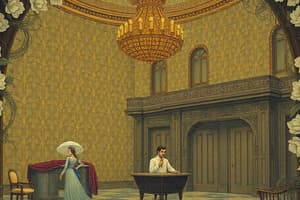Podcast
Questions and Answers
What genre can Demons by Fyodor Dostoevsky be classified as?
What genre can Demons by Fyodor Dostoevsky be classified as?
- A blend of Existentialist Philosophy and Historical Fiction
- Social and Political Satire only
- Psychological Drama only
- A blend of Social and Political Satire, Psychological Drama, and Large-Scale Tragedy (correct)
What is the primary impact of Fyodor Dostoevsky's works on literature?
What is the primary impact of Fyodor Dostoevsky's works on literature?
- The creation of a new style of historical fiction
- The development of romantic comedy as a genre
- The popularization of adventure novels
- A huge influence on literary modernism, existentialism, and psychology (correct)
What is Fyodor Dostoevsky famous for?
What is Fyodor Dostoevsky famous for?
- Historical fiction about the Russian Revolution
- Deeply psychological novels exploring complex characters and moral dilemmas (correct)
- Adventure novels set in the American West
- Writing romantic comedies
What is Nikolai Stavrogin's personality like?
What is Nikolai Stavrogin's personality like?
What is the consequence of the plot in Demons?
What is the consequence of the plot in Demons?
What is the main theme of Demons?
What is the main theme of Demons?
What is Fyodor Dostoevsky's most famous work?
What is Fyodor Dostoevsky's most famous work?
What is the tone of Demons?
What is the tone of Demons?
What is Nikolai Stavrogin's role in the story?
What is Nikolai Stavrogin's role in the story?
What is the historical context of Demons?
What is the historical context of Demons?
Flashcards are hidden until you start studying
Study Notes
Novel Overview
- Demons, a novel by Fyodor Dostoevsky, is a complex work blending social and political satire, psychological drama, and large-scale tragedy.
- The story revolves around Pyotr Verkhovensky, who manipulates discontented youth with radical ideas, leading to a series of scandals, tragedies, and ultimately, violence and death.
Characters
- Nikolai Stavrogin: A mysterious and enigmatic character, shrouded in past trauma, with a sense of apathy, and seemingly incapable of genuine connection.
- Pyotr Verkhovensky: The manipulative mastermind behind the chaos, using radical ideas to control and exploit vulnerable youth.
Symbolism
- "Demons" represent destructive ideologies and nihilistic beliefs that possess characters, leading them down a dark path.
- "Corners" symbolize feelings of being trapped, hopeless, and driven to despair by one's choices.
- "Shame and Sin" are intertwined, with unbelief and embracing nihilism linked to sin, and characters grappling with shame.
Writing Style
- The novel features vivid dialogue, charged with emotion, reflecting characters' clashing ideologies and personalities.
- Dramatic irony creates suspense, as the reader often knows more than the characters, highlighting their flawed perceptions.
- Dostoevsky employs psychological realism, portraying characters with depth, reflecting the complexities of human nature.
Structure
- The story unfolds through multiple perspectives, including letters, diaries, and narrated sections, providing a multifaceted view of events and characters' motivations.
- Intertwining storylines create a sense of chaos, mirroring the societal unrest of the time.
- The novel focuses on inner conflict, exploring characters' anxieties, doubts, and philosophical debates.
Author Background
- Fyodor Dostoevsky is a giant of Russian literature, considered one of the greatest novelists ever.
- He is famous for deeply psychological novels exploring complex characters and moral dilemmas, often set against a backdrop of 19th-century Russia.
- Dostoevsky's major works include Crime and Punishment, The Idiot, The Brothers Karamazov, and Notes from Underground.
Studying That Suits You
Use AI to generate personalized quizzes and flashcards to suit your learning preferences.




